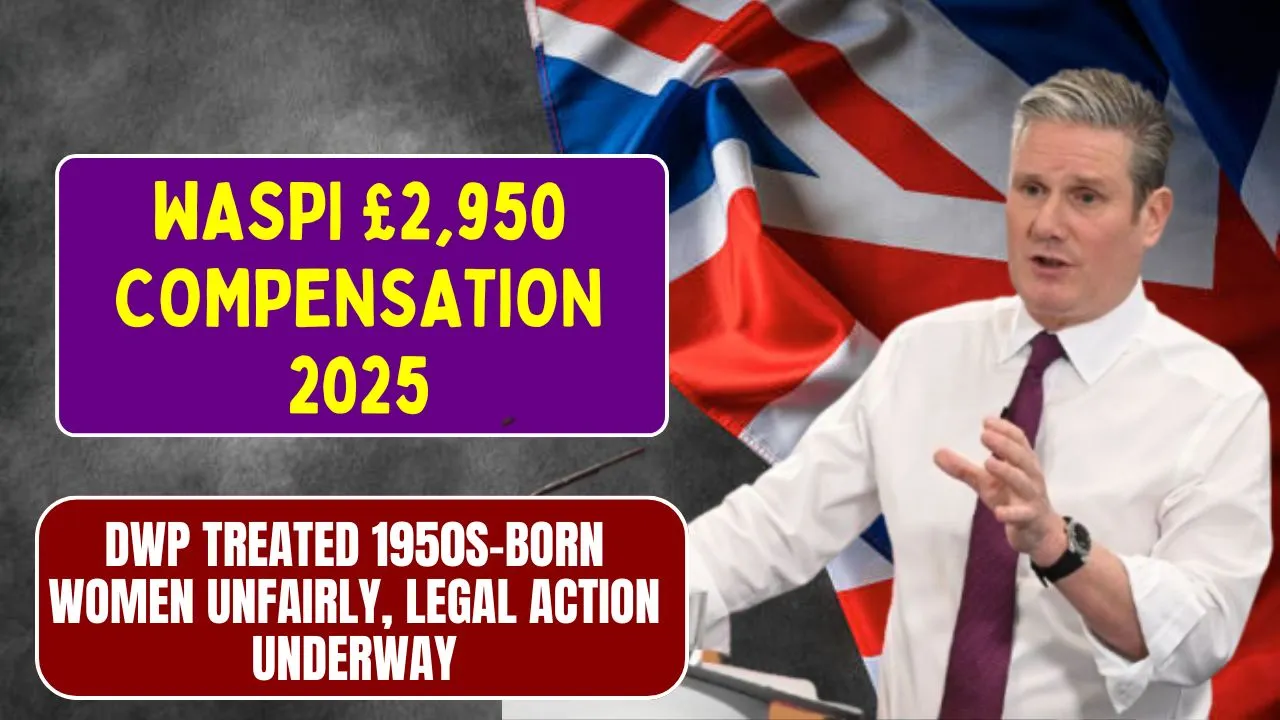WASPI £2950 Compensation 2025: The fight for justice by the Women Against State Pension Inequality (WASPI) campaign has reached a new turning point. Women born in the 1950s, who were impacted by the sudden increase in the state pension age, continue to push for fair treatment from the Department for Work and Pensions (DWP). Many say they were not properly informed of the changes, which led to financial stress and disrupted retirement plans.
At the centre of the issue now is the WASPI £2,950 Compensation 2025 proposal. A recent update from May 9, 2025, shows the campaign is gaining legal momentum. With a judicial review application filed, legal experts believe these women could finally receive compensation—between £1,000 and £2,950—for the unfair way they were treated. This article explains everything you need to know about the compensation efforts, the legal arguments, and what could happen next.
WASPI £2,950 Compensation 2025: Key Developments and Legal Action
The WASPI £2,950 Compensation 2025 is based on a recommendation from the Parliamentary and Health Service Ombudsman, which found that the DWP failed to properly notify women born in the 1950s about changes to the pension age. As a result, thousands of women were left unprepared for delayed retirements. Despite the Ombudsman’s advice, the government has refused compensation, prompting WASPI to take legal action.
A judicial review application has now been submitted to challenge this refusal. Legal experts suggest the case has a solid foundation, as it argues the issue is not about changing laws, but whether the government followed a fair process in informing these women.
Overview of WASPI £2,950 Compensation 2025
| Aspect | Details |
| Campaign Name | WASPI – Women Against State Pension Inequality |
| Key Issue | Lack of timely notice about pension age changes |
| Affected Group | Women born in the 1950s |
| DWP Action in Question | Delay in communication about pension age increase |
| Compensation Proposed | £1,000 to £2,950 (based on individual circumstances) |
| Legal Move | Judicial review filed in High Court |
| Funding Raised | Over £187,000 through crowdfunding |
| Expert Opinion | Strong legal case due to lack of procedural fairness |
DWP WASPI £2,950 New Update 9 May 2025 – What It Is All About?
The WASPI campaign began when women affected by the increase in state pension age realised they were not given enough warning. For many, retirement planning was based on retiring at 60. But changes raised the pension age first to 65 and then to 66—without clear or timely notice. These women say they were unfairly treated compared to others, and that the government failed to communicate the change effectively.
WASPI campaigners argue that this lack of notice had major impacts on their lives, leaving them in financial hardship. The movement is not asking to reverse the pension age change but is demanding fair compensation for how the transition was handled.
The Ombudsman’s Recommendation
After investigating the complaints, the Parliamentary and Health Service Ombudsman agreed that the DWP failed to inform these women properly. It concluded that the lack of clear communication amounted to maladministration. Based on the findings, the Ombudsman suggested the affected women should receive compensation ranging from £1,000 to £2,950, depending on how much they were affected.
This recommendation was a major step forward for the WASPI cause. However, despite the Ombudsman’s findings, the government refused to make payments, saying most women were already aware of the changes and earlier letters wouldn’t have made a difference.
WASPI Takes the Legal Route
Refusing to accept the government’s position, the WASPI campaign has now taken legal action. They have filed for a judicial review, asking the High Court to look into the fairness of the DWP’s decision. Legal teams on both sides have submitted documents, and the court will now decide whether the case should be heard.
Supporters of the WASPI campaign have shown strong backing, raising more than £187,000 to fund legal costs. This money was collected through online crowdfunding and shows the public support behind the campaign.
Legal Experts Believe WASPI Has a Strong Chance
Legal expert John Beck has stated that WASPI’s case is not about changing existing laws, but about whether the DWP followed fair procedures. He believes the core legal argument is procedural fairness—the idea that everyone should be treated equally under the law.
Beck noted that if the court finds that the DWP treated the 1950s-born women differently from other groups, it could rule in favour of the WASPI campaign. A favourable ruling would mean that the government might be forced to reconsider its refusal to pay compensation.
Could Labour Change Its Mind?
Although the Labour government has so far denied any compensation, some believe they may offer a small, means-tested settlement if public pressure or court outcomes become too strong. According to Beck, if Labour thinks they might lose in court or face criticism before the elections, they could introduce a limited payout to those worst affected.
This move could help the government avoid both legal defeat and negative headlines, while still managing public spending responsibly.
What’s Next?
The next step is for the High Court to decide whether to move forward with the judicial review. If approved, the hearing will examine whether the DWP acted fairly and legally when it failed to properly inform women about the pension age changes.
If WASPI wins, the government could be forced to pay compensation or at least return to the negotiation table. Regardless of the result, the campaign has already shown how citizens can stand up for fairness and demand accountability from government departments.
FAQs
What is the WASPI campaign about?
WASPI stands for Women Against State Pension Inequality. The campaign represents women born in the 1950s who say they weren’t properly informed about changes to their pension age, affecting their retirement plans.
Why are WASPI women asking for compensation?
They believe the DWP did not give enough notice about the pension changes, causing emotional and financial hardship. The Ombudsman agrees they were treated unfairly.
How much compensation could they receive?
The Parliamentary Ombudsman recommended payments between £1,000 and £2,950 based on individual circumstances.
What is the judicial review?
A judicial review is a legal process where a court checks if a government decision was made fairly. WASPI is using this to challenge the DWP’s refusal to pay compensation.
Can the government change its stance?
Yes. Legal experts believe the government might offer a limited payout if public pressure increases or the court rules in WASPI’s favour.
Final Thought
The WASPI £2,950 Compensation 2025 campaign is more than just a legal case—it’s a stand for fairness, respect, and recognition of the challenges faced by a generation of women. With legal backing, public support, and a powerful message of justice, WASPI is closer than ever to achieving the compensation it seeks. Whether or not the courts side with them, the campaign has highlighted the importance of transparency, equality, and standing up for what’s right. Share this article to spread awareness, and don’t forget to explore your daily horoscope and other trending updates on our platform.







